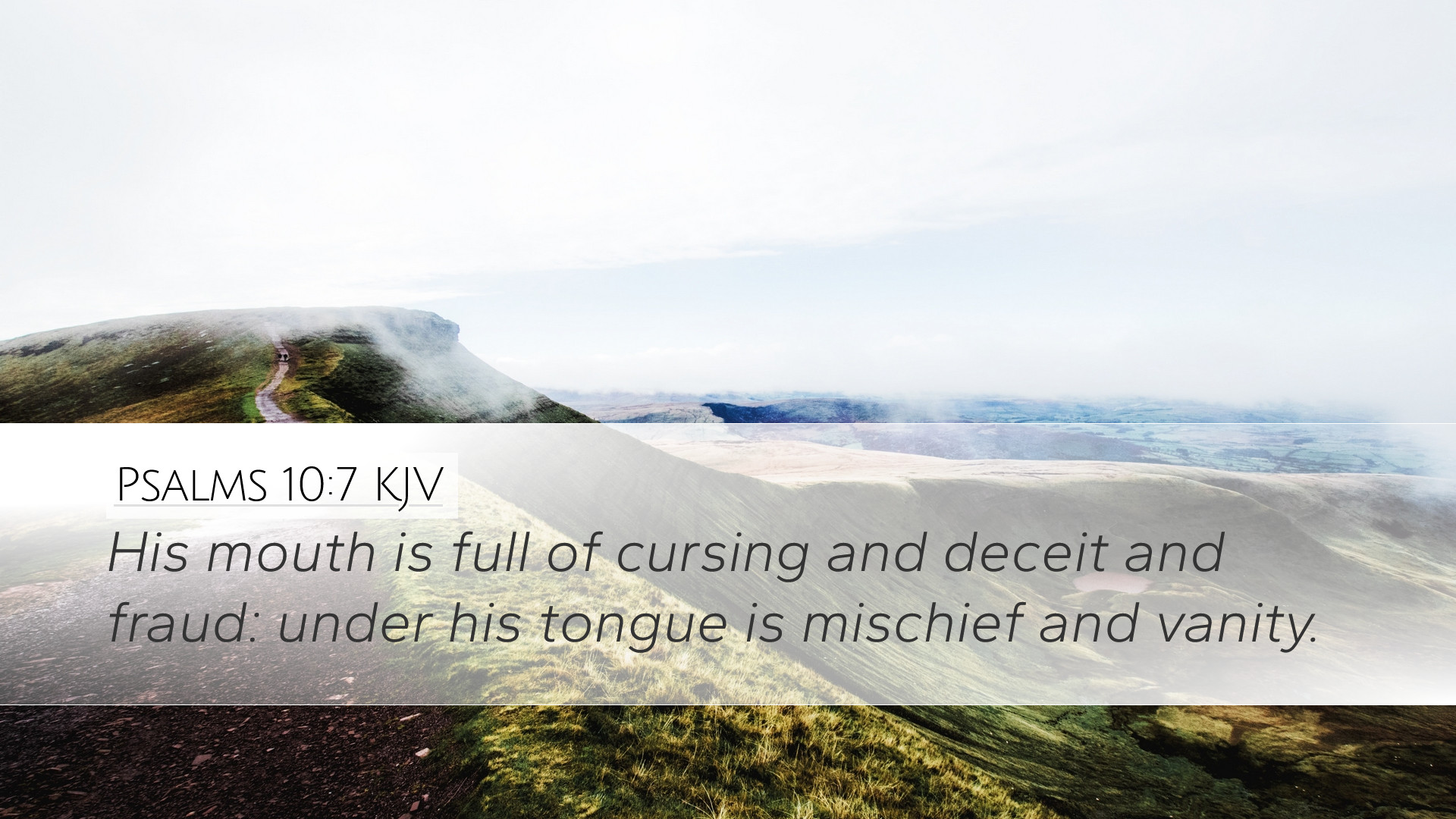Psalms 10:7 - Commentary and Insights
Verse Reference: Psalms 10:7 - "His mouth is full of cursing and deceit and fraud: under his tongue is mischief and vanity."
1. Introduction
This verse from the Book of Psalms encapsulates a powerful indictment against the wicked, specifically addressing the way they communicate and the undercurrent of evil in their speech. The psalmist contrasts the righteous with the wicked, shedding light on the moral decay that pervades society, where deceit and malevolence emanate from the hearts of those who stand in opposition to God's ways.
2. Contextual Analysis
According to Matthew Henry's Commentary, the Psalms serve as profound expressions of human emotion, particularly those directed toward God in distress. Specifically, this verse belongs to a larger context where the psalmist laments the silence of God amidst the oppression experienced by the righteous. It showcases the tongue of the wicked as an instrument of evil, categorizing their speech as not just deceptive but also laden with malicious intent.
3. The Wicked's Speech
- Full of Cursing: The term "cursing" indicates not only a misuse of words but also a disposition filled with bitterness. Albert Barnes emphasizes that such speech reflects a heart estranged from God, showcasing the deep-seated corruption within.
- Deceit and Fraud: This duality in the expression points toward a premeditated intention to mislead others. According to Adam Clarke, deceit in the mouth of the wicked serves as a facade for their malicious schemes, often leading to societal turmoil and injustice.
- Mischief and Vanity: The final components found "under his tongue" indicate that not only are words spoken with intention but also a willingness to propagate chaos. Henry notes that such speech lacks substantive value, instead producing only disorder and strife.
4. Theological Implications
This verse presents significant theological implications regarding the nature of sin and the character of the wicked. It reveals that moral evil often manifests through the spoken word. The mouth, as a metaphor, illustrates how outward expressions can betray inner corruption:
- Revelation of Nature: The speech of the wicked points to a deeper spiritual sickness, likened by Barnes to a rotten tree bearing bad fruit.
- Consequences of Evil Speech: Words can be destructive; they carry weight that can alter lives and shape societal norms. Clarke refers to James 3:6, which states that the tongue is a fire, demonstrating the capacity for significant harm.
- God's Justice: Understanding the wicked's speech encourages believers to cling to the hope of divine justice. The psalmist’s lament expresses the need for God to arise and address the injustices initiated by such speech.
5. Practical Applications
For pastors, theologians, and students of the Bible, this verse serves as a crucial reminder of the power of words and the necessity to guard our tongues:
- Reflection on Personal Speech: Believers are called to examine their own speech, ensuring that it uplifts and edifies rather than tearing down or deceiving.
- Awareness of Cultural Forces: Understanding the implications of this verse may lead to advocacy against societal norms that embrace deceitful speech.
- Encouragement of Truth-Telling: In a world where deceit is rampant, the believer's role is to model integrity and honesty in speech.
- Prayer for Divine Intervention: Just as the psalmist calls for God to act, we also must seek God's assistance in confronting cultural evils rooted in deceit.
6. Conclusion
Psalms 10:7 reveals a world filled with the perils of wicked speech, driven by cursing, deceit, and malice. As the psalmist implores God to pay attention to the injustices, it reminds readers that righteousness ultimately prevails. This verse calls for introspection about our speech while instilling hope in God's faithful response to moral decay.


